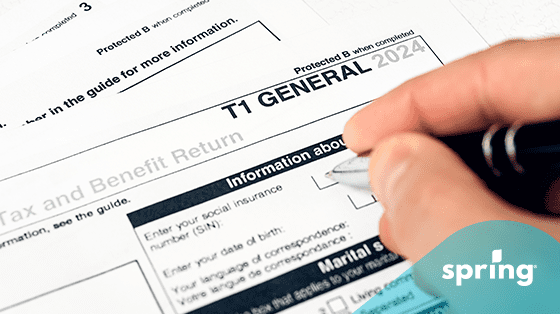While many provinces have average incomes that are higher than the Canadian average, it’s important to also consider the cost of living as well. In some places, the cost of living is high, as is the average, so it can actually be more expensive to live in that province. Let’s take a look at the difference in average incomes per province.
Average Annual Salary in Canada
While the average annual income for Canadians varies from year to year, the national average for 2024 is $72,000 per year that Canadians earn or $6,000 per month. It’s important to note that, though, the annual income is pre-tax.
You’ll notice that this number is different from the provincial averages, and it varies from year to year. In 2023, the average annual income was $63,181.04, and the average in 2022 was $59,300. This is different from the average Canadian household income which is $92,764 annually.
Average Median Canadian Income for the Last 10 Years
As we know, the average salary in Canada varies from year to year. Along with the annual average income, there’s also the average median income. Here are the average median incomes starting from 2012 to 2021.
| Year | Average Median Income |
| 2021 | $41,650 |
| 2020 | $40,630 |
| 2019 | $37,710 |
| 2018 | $36,760 |
| 2017 | $35,680 |
| 2016 | $34,420 |
| 2015 | $33,920 |
| 2014 | $32,790 |
| 2013 | $32,020 |
Average Income by Province
While we’ve already discussed the average income in Canada, we haven’t discussed the average income in each province. You’ll notice that the individual provincial incomes vary greatly from the average individual income in Canada. Here is the average individual income from 2023.
| Province | Average Individual Income |
| British Columbia | $66,232 |
| Alberta | $74,237 |
| Saskatchewan | $88,424 |
| Manitoba | $58,500 |
| Ontario | $63,369 |
| Quebec | $57,506 |
| Prince Edward Island | $46,160 |
| Nova Scotia | $56,550 |
| New Brunswick | $57,336 |
| Newfoundland and Labrador | $52,562 |
| Yukon | $62,500 |
| Nunavut | $74,900 |
| Northwest Territories | $77,900 |
Average Income by Gender in Canada
The average income in Canada can vary based on gender. Generally, if we base the average income based on gender, the income for males is higher. Let’s take a look at the average income based on gender and province. That said, these income amounts are from 2021, according to Statistics Canada.
| Province | Average Income of Females | Average Income of Males |
| British Columbia | $46,700 | $63,000 |
| Alberta | $47,600 | $70,300 |
| Saskatchewan | $44,200 | $59,700 |
| Manitoba | $42,600 | $56,000 |
| Ontario | $47,600 | $63,000 |
| Quebec | $44,700 | $57,700 |
| Prince Edward Island | $41,100 | $52,100 |
| Nova Scotia | $41,600 | $55,000 |
| New Brunswick | $40,700 | $54,300 |
| Newfoundland and Labrador | $41,900 | $57,000 |
Here you can really see the income inequality based on gender and it’s very similar in each province. They all have a very substancial income gap.
Province With the Highest Income in Canada
There are many provinces in Canada that are considered high income earners. That said, there’s one province with the highest average income: Saskatchewan. In Saskatchewan, the average income is $88,434, which is much higher compared to the rest of the country. That said, how much you make is relative to the cost of living. Keep in mind that these are total based on annual income taxes, not market income.
Average Income in Ontario
In Ontario, the average income for Candian tax filers $63,369. While this is a decent yearly income, it is relative to the cost of living in Ontario, which includes rent, groceries, utilities, and other basic living expenses.
In general, when living in Ontario, the average cost of living for one person depends on where you live. That said, the cost of living for a single person in Ottawa is $2,822 per month, while it’s $3,551 per month in Toronto. It’s important to note, though, that these numbers don’t even include rent. The average rent for a single person per month is $1,877. This will change, though, based on where you live in Ontario.
If you don’t rent, you still need to factor in the cost of purchasing a home. Ontario is one of the most expensive provinces in Canada, and the average cost of a home is $887,290. That said, the exact cost does vary based on where you choose to purchase a home in Ontario. The more rural areas tend to be more affordable than those in the city.
Average Income in British Columbia
British Columbia is another province considered to be one of the most expensive in Canada. Although living outside of the city in this province is much cheaper, it’s still considerably more expensive than other provinces.
In British Columbia, research shows that the average annual income for a single person is $66,232. For someone living in Vancouver, the average cost of living is $3,445 per month, not including rent, which is an average of $2,034. Combined, this equals a total of $5,479 per month on average. With the annual average income, this is pretty much all of your money spent every month. This could be even more expensive if you’re choosing to purchase a home which can cost even more money depending on the mortgage rates.
While purchasing a home outside of Vancouver is a little more affordable, it’s still very expensive. In BC, the average cost of purchasing a home is $913,471, which is considerably higher than most other Canadian provinces. With the current mortgage rates, the cost of a mortgage in BC can also be really high.
Average Income in Alberta
Alberta’s cost of living is lower than many other provinces, making it a very affordable place to live. The annual average income is $74,237, while the average cost of living is $2,449 per month for a single person without rent, and rent is an average of $1,669 per month.
Alberta is also much cheaper than many other provinces when it comes to purchasing a home. The average price to purchase a home in Alberta is $401,706, which is less than half of the cost of purchasing a home in British Columbia.
Another thing to consider when factoring in the cost of living in Alberta is the taxes. While many provinces charge both GST and PST on purchases, many purchases in Alberta only charge the PST of 5%. This can be a real money saver compared to the cost of taxes in other provinces.
Average Income in Nova Scotia
In Nova Scotia, the average annual income is $56,550. The average cost of living per month is $2,377, but it doesn’t include the cost of rent. The average cost of rent in Nova Scotia, though, is $1,595 per month, equaling a total of $3,972 per month.
Another thing to consider in Nova Scotia is the cost of purchasing a home. However, the cost of housing is relatively affordable. The average cost of purchasing a home is only $356,757, and even with the increased mortgage rates, it can be affordable for those looking to purchase their first home.
Average Income in Saskatchewan
Saskatchewan has the highest average annual income, at $88,424. The average rent is $1,507 per month, and the cost of living is $1,097, which leaves quite a bit of disposable income.
The average cost of a home in Saskatchewan is $286,000. Even with high mortgage rates, this is still affordable for many people, especially those with higher-than-average annual incomes.
The cost of food varies based on where you live in Canada. That said, the cost of food is still high no matter where you live.
Average Income in Manitoba
In Manitoba, the average annual income for a single person is $58,500. When you take into consideration that the average cost of rent is $1,523 per month and the average cost of living is $1,539 per month, it’s a very livable wage. With that in mind, though, there’s still the cost of purchasing a house to consider.
In Manitoba, the average cost to purchase a house is $321,504. While the cost can be a bit higher the closer you get to the city, the cost tends to be lower when you’re in a more rural area. On top of that, you also need to consider the cost of food as well as other costs for basic needs. As far as the wage to cost of living ratio, though, Manitoba is relatively affordable.
Percentage of Canadians That Make More Than $100,000
In Canada, based on your profession, what your annual wage is varies. That said, only roughly 10-15% of Canadians have an income larger than $100,000 per year and are considered to be top earners. However, 25% of Canadians have an annual income larger than $81,000 per year.
It’s not surprising that ¼ of Canada’s population makes more than $81,000 annually based on the average income in Canada. For most places in Canada, this is more than enough for a living wage. In a lot of places in Canada, $45,000 after tax income is considered to be enough for a living wage for a single person. Depending on which profession you choose and where you live, you don’t even need a university degree in order to earn this total income.
Average Income Based on Age
When we’re considering the income earned by Canadians annually, it’s not just the province that affects the income. Age is also a large factor. As a general rule of thumb, the older you are, the more income you earn, until you hit retirement age. With that in mind, let’s take a look at the annual average income based on age groups.
| Age | Average Income in Canada |
| 16 to 24 | $20,000 |
| 25 to 34 | $53,500 |
| 35 to 44 | $68,000 |
| 44 to 54 | $73,200 |
| 55 to 64 | $61,400 |
| 65 plus | $44,300 |
As you can see, those who are just entering the workforce have the smallest annual income. As experience is gained, the annual income increases until retirement age is reached. While this does vary from province to province, the Canadian average is fairly accurate.
Average Income in Large Canadian Cities
When you’re considering where to live in Canada, you don’t just need to consider the cost of living in a province, it’s also important to consider what the cost of living is in the major cities. Let’s take a look at how much it costs to live in some of the largest cities in Canada for both rent and the average cost of living.
| City | Single Person | Family of 4 |
| Toronto | $3,551 | $6,144 |
| Vancouver | $3,445 | $5,955 |
| Ottawa | $2,822 | $5,329 |
| Montreal | $2,384 | $4,799 |
| Calgary | $2,449 | $5,110 |
| Halifax | $2,377 | $4,698 |
| Quebec City | $1,871 | $4,126 |
As you can see, the average cost of living varies a lot from city to city. Here’s a look at the cost of rent versus the cost of purchasing in each major Canadian city.
| City | 1 Bedroom Apartment | Cost of Single Family Dwelling |
| Toronto | $1,423 | $1,200,000 |
| Vancouver | $1,447 | $1,470,265 |
| Ottawa | $1,189 | $383,793 |
| Montreal | $916 | $325,900 |
| Calgary | $1,205 | $491,394 |
| Halifax | $893 | $360,586 |
| Quebec City | $731 | $240,000 |
Average Cost of Rent and Purchasing and Each Province
Above we go over the cost of renting and purchasing in major Canadian cities, but what we don’t do is go over the cost of rent and purchasing on average in each Canadian province. Let’s take a look.
| Province | Average Cost of Rent | Average Cost of Housing |
| British Columbia | $2,034 | $913,471 |
| Alberta | $1,669 | $401,706 |
| Saskatchewan | $1,507 | $286,000 |
| Manitoba | $1,523 | $321,504 |
| Quebec | $1,602 | $459,955 |
| PEI | $1,409 | $335,202 |
| Newfoundland and Labrador | $1,463 | $321,700 |
| Ontario | $1,877 | $887,290 |
| New Brunswick | $1,369 | $262,200 |
| Nova Scotia | $1,595 | $356,757 |
Most Expensive Places to Live in Canada
When it comes to the most expensive places to live in Canada, you’re looking at both British Columbia and Ontario. However, the most expensive place to live in Canada is Vancouver, with Toronto as a close second.
In BC, not only is the cost of housing high but so is the cost of living. BC doesn’t even have the highest income average in Canada. This makes it really difficult for those looking to purchase a home and grow their families in this part of Canada.
You also have to consider the cost of sales tax in BC since BC charges both Provincial Sales Tax (PST) and Goods and Services Tax (GST). Ontario, however, charges HST, also known as Harmonized Sales Tax, meaning that both PST and GST are combined.
Cheapest Places to Live in Canada
While BC and Ontario are some of the most expensive places to live in Canada, we can’t forget to mention some of the cheapest places to live in Canada. While there are plenty to mention, the more affordable place to live in Canada is actually New Brunswick. Not only is their cost of housing low relative to the annual average income, they also have very affordable house and car insurance.
New Brunswick isn’t the only affordable place to live on the east coast, though. Newfoundland and Labrador is also a very affordable province to live in. While the cost of food is comparable to the rest of Canada, the cost of their other basic living costs is much cheaper.
If you don’t want to live on the east coast in order to live in a more affordable environment, the prairies are also very affordable compared to the average annual income there. Prairie provinces are very different from living on the east or west coast, but they have a very welcoming charm for those looking to expand their horizons and live in a more affordable environment.
Final Thoughts
No matter where you live in Canada, it’s one of the most expensive countries to live in. That said, there are some provinces that are less expensive than others. You can also see that the average annual income in Canada varies based on where you live as well.
When looking at the average income, though, it’s also important to consider the average cost of living. This can put in perspective the actual cost of living and which province is the best place to live.
In Canada, the most expensive provinces to live in include Ontario and BC. These provinces do have a close to average annual income average, however the cost of living is exceptionally higher than that of other provinces in Canada. That said, the most affordable places to live in Canada include New Brunswick and Newfoundland and Labrador.
While Newfoundland and New Brunswick don’t have the highest annual income averages, they have a much lower cost of living. This lower cost of living allows more Canadians to afford the lifestyle that they’re comfortable with while having a reasonable amount of disposable income.
No matter where you choose to live in Canada, though, it’s important to do your research and figure out where you can earn the best income with the lowest cost of living for your lifestyle.









